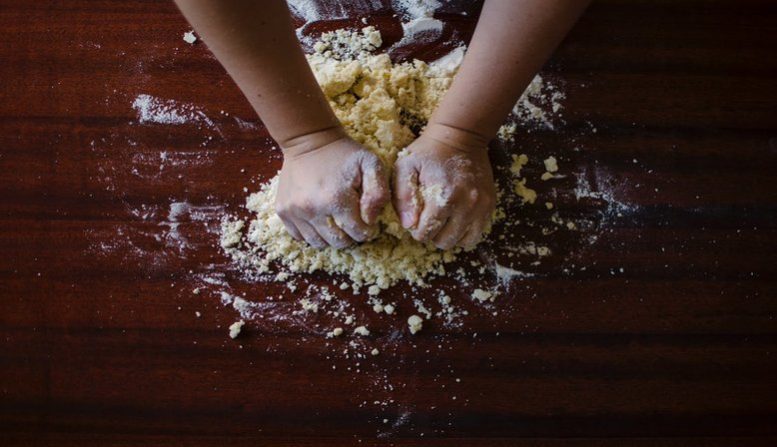Entering the Culinary World of Baking
Last Updated on February 22, 2023
Do you have a passion for the culinary arts with a special interest in baking or becoming a pastry chef? Do you have a desire to turn that passion into a way to earn a living? Let’s delve right into the two main types of baking careers and learn what it takes to enter the culinary world of baking.
About Baking as a Career
A baking career can take many forms. Most often, bakers have worked their magic in the kitchen long before considering it as a career. Baking is certainly as much of an art as it is a skill. Just a few simple ingredients and a recipe transforms into delectable samplings that are sure to delight.
The two main types of baking careers are that of a baker and a pastry chef. Both careers are similar and it should be noted that all pastry chefs are bakers but not all bakers are pastry chefs. Let’s clarify things.
A traditional baker measures and mixes ingredients and bakes recipes according to instructions. However, baking is somewhat of a science and an art.
A good baker is skilled and has a certain amount of intuition they must go by to succeed. For instance, the tiniest of inaccuracies in a recipe can throw a whole batch off. Or, humidity in the air can affect a recipe. A skilled and experienced baker learns to make adjustments when they notice a consistency in a recipe is off.
A baker can work in a commercial or retail bakery, a grocery store, or a restaurant. Many today opt to open their own cottage bakery out of their home in states where cottage laws are relaxed. Bakers tend to work more with large-scale orders on various types of bread, pastries, cakes, and pies.
Pastry chefs, on the other hand, tend to lend their skills to a more focused or specialized area. Many pastry chefs work in restaurant settings or as caterers, with smaller volumes of baked goods than regular bakers.
Pastry chefs often work on more complex tasks than bakers and many put more creative energy into what they do. Often, pastry chefs create works of art within their menus and turn bakery items into intricate presentations. Many pastry chefs also make discoveries about their chosen field in unexpected ways.
Pastry chefs take on more administrative roles than bakers as they tend to be more responsible for the creation of menus and overseeing others.
The Skills of a Baker or Pastry Chef
Not just anyone can be a baker or a pastry chef. Usually, a person who chooses to enter the field does so out of a passion for baking. But baking doesn’t just involve the task itself.
- You need to understand measurements and be good with numbers to get recipes correct.
- Good organizational skills are also needed to be a baker.
- The ability to work with a team is a plus if you’re making bakery items on a large scale.
- You also need to be intuitive and be able to realize when a batch is off, even before it goes into the oven.
- A certain amount of creativity is another bonus.
- You need to be able to work well under stress, both in terms of when a recipe fails to turn out as expected and in terms of working with deadlines.
Baking Career Salaries
The Bureau of Labor Statistics says that as of 2016, bakers earned an annual median income of $25,090. Pastry chefs can earn quite a bit more as their salaries tend to average $43,180 a year. Salaries can vary, depending on the volume of orders, where you live, whether you also own your own bakery, or other factors.
For-Instances
PR Management Corp, a Panera franchise ownership group in New England is offering bakery jobs in Worchester, MA. Many of the available positions offer the kind of initial training that will help a young baker start their career at a well-regarded bakery chain.
Kneaders Bakery & Cafe is a franchise that’s located in six western states and they produce artisan bread and pastries. The company is known for its charitable operations as they partner with local non-profit organizations to feed the needy in their local communities. They have job openings in Utah, Colorado, and in many of the states where they operate.
Training and Requirements
Most bakers and pastry chefs learn their skills through experience in their own kitchens or work histories and experience. However, those who are serious about their craft usually receive training from a culinary arts school or college.
Community colleges also offer culinary programs that many aspiring bakers choose to undertake. Many also learn through apprenticeship programs in which they combine hands-on training with formal classroom education. Others try to earn certification from the American Culinary Federation.
Author: Phyllis Romero
A former bakery owner, Phyllis Romero is an experienced freelance writer with an extensive authorship. Her experience includes writing and editing for her local newspaper, short fiction, poetry, and non-fiction work on numerous subjects. She enjoys visiting artisan style coffee houses, shopping for antiques, and gardening. Her dream is to open her own bed and breakfast where she can relax in her garden of flowering perennials, herbs, and English roses and write novels all day while her husband handles the boring details.
Related: BAKERpedia Your go-to digital resource for all things commercial bakery and food innovation. They provide simple and credible solutions to complex challenges, so you can focus on the things that matter, business growth in a competitive commercial baking environment.
Subscribe to our newsletter for details on mentorship sessions, workshops, webinars, as well as career and job fairs across Canada and the US!


leave your comment